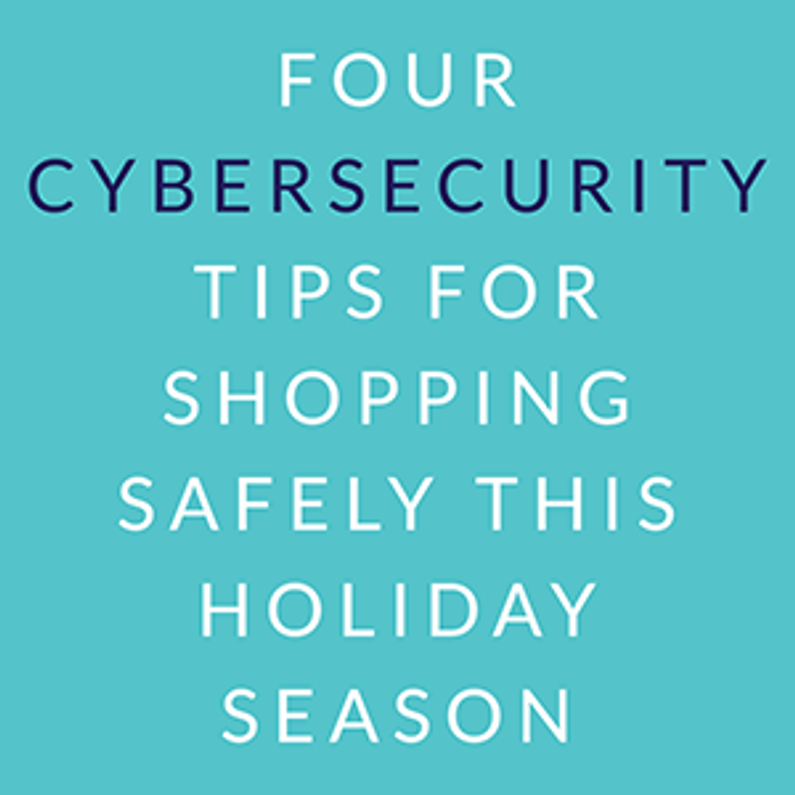4 Cybersecurity Tips for Shopping Safely This Holiday Season
With the holiday shopping season in full swing, many consumers are preparing to shop the many sales that today’s online retailers have to offer. Over half of this year’s holiday spending is anticipated to be online, so it’s not surprising that 60 percent of consumers are planning to shop from e-commerce sites. While shopping online is a convenient way to avoid the holiday crowds, it’s important that consumers protect their wallets on the internet just as much as they would while shopping in-store.
In 2016 alone, the FBI’s Internet Crime Complaint Center received nearly 300,000 online-theft complaints and victims lost a total of $1.3 billion.
While you’re shopping online for gifts, online criminals are shopping for your data. The increased volume of online shopping heightens the risk for cyber attacks and can make you more vulnerable to identity theft. In fact, 49% of shoppers agreed that they don't even think about breaches when shopping on the web, putting themselves especially susceptible to hackers that are specifically targeting them. If you’re planning to shop online this holiday season, we advise you to adopt safe shopping practices before purchasing items online.
Here are 4 measures you can take to ensure that you’re shopping safely this holiday season.
1. Use a Credit Card Instead of Debit Card
While both methods are simple, credit cards are less risky when it comes to fraud. While money is immediately taken from your checking account when you use a debit card, with a credit card, you (or thieves with your card number) spend the bank’s money and have a grace period before the payment is actually due. This gives you more time to notice any discrepancies and dispute them. In addition, if your credit card information is stolen, you’re only liable for up to $50 of unauthorized charges.
You may also want to consider using PayPal, Google Wallet, or Apple Wallet as an added layer of protection.
2. Stick to Secure Sites
Make sure that any site you shop from begins with an “https” in its website URL. This indicates that it is a secure site, as the information being passed through is encrypted and not easily read by hackers, making it harder for your information to be stolen.
The best way to protect yourself when shopping online is to always buy from companies that you know and trust. Online retailers like Target, Best Buy and Walmart are all reputable sites that offer some of the best deals of the season. If you choose to shop on Amazon or eBay, be sure you’re shopping with a verified vendor.
3. Change Your Passwords
If you hold a member account for any e-commerce retailer, it’s important that your passwords are unique from site to site. If you haven’t changed your password in the past month or so, now is the time to do so. Accounts that we maintain with retail websites contain a great deal of personal data, like our credit card information and address. It can be tempting to use the same password on multiple accounts, as it’s much easier to remember just one password than many. This means, however, if a hacker gains access to one account, they gain access to all of them. Changing your passwords to something different and unique to each account will make it so that even if someone does guess one password, they can’t use it for anything else.
Creating dozens of unique passwords can be tedious and difficult to monitor, so it can be helpful to keep track of them all in a note card or journal. When coming up with a new password, you want something that can be safe from guesswork and hacking attempts. Avoid using personal information like dates, names, or addresses, as hacking programs can actually guess your passwords by associating information relevant to you. Try using random combinations of numbers, letters, and symbols, or even utilize an online password generator.
4. Limit Activity on Public WiFi Networks
Nothing is more aggravating than lining up to shop in-store, just to find out that the one item you’re hoping to buy is sold out. Instead, head home to use your private WiFi network before placing an order online.
Public WiFi networks, which are often sources of free WiFi at shopping malls, hotels or restaurants, often make it easy for hackers to position themselves between you and the access point. Though many people don’t realize the dangers of connecting to public WiFi networks, it’s important to know that anything you do on a public network isn’t secure. Rather than dealing directly with the network, you’re sending all of your information to the hacker, including emails, phone numbers, credit card information, business data, and more.
If you must shop online using public WiFi, consider installing and using a VPN—short for “virtual private network”—on all mobile devices and computers before connecting to any WiFi network. A VPN will establish an encrypted connection between your device and the VPN server, which makes your data much safer from hacker interception.
Not only is it smart to shop safely during the holiday season, but it’s also important to use these methods year-round. Don’t make exceptions or careless mistakes when it comes to the safety and security of your identity and money. Following a few simple steps ensures that your information and identity are safe when shopping online.
Recent Posts
-
What You Need to Know to Donate Safely Online
Cybersecurity has become an increasingly critical issue in the digital age. For instance, in 2016, m …Mar 10th 2022 -
What is a Default Gateway?
A default gateway is where all your internet traffic goes first before leaving your network. That’s …Jan 4th 2022 -
Essential Cybersecurity Tools Every Business Needs
IT infrastructures across organizations are now more complex than ever. Given the increasing number …Nov 29th 2021




